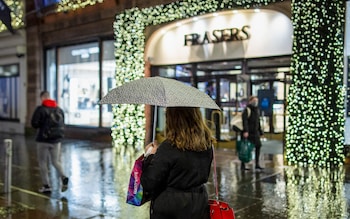Rachel Reeves said she wouldn't dodge difficult choices as chancellor and, in her first major intervention, she was as good as her word.
She announced spending cuts that will make some of her own MPs wince after revealing funding shortfalls that startled economists.
Ms Reeves says the "public spending audit" was a response to a £22bn hole in the public finances discovered in her opening days in the Treasury, a "mess" left by her predecessor about which she could not have known.
She spoke of a need to "level" with the public.
Politics latest: Chancellor heckled as she announces 'black hole' spending cuts
Jeremy Hunt and his diminished band of colleagues on the opposition benches meanwhile say this was the profoundly political act of a new chancellor laying the ground for tax rises she would not discuss before the election.
Ms Reeves is right that the public finances are deeply stressed. There was a £87bn funding deficit in 2024-25 even before today's figures, growth is tepid, and the Treasury's reserves of just over £9bn could be spent several times over, through spiralling costs and unfunded policy commitments.
The immigration system is running £6.4bn over budget, largely because of the spiralling hotel bill for migrants whose claims were not processed pending the Rwanda plan, now jettisoned.
She is also right that the last government made policy announcements without allocating funding.
Existing pay settlements for public sector workers, the NHS workforce plan, social care reform, even Rishi Sunak's pet education project the Advanced British Standard intended to replace A-Levels were plans without money to pay for them.
And it is also true that in some of these areas, specifically spending overruns in the current financial year as opposed to longer-term budget plans, she could not have known in advance of taking power.
Read more:
Reeves reveals date for Labour's first budget
Chancellor's key funding gap accusations and what she plans to do
Under current rules, Treasury officials cannot inform the opposition of spending pressures, and the Office for Budget Responsibility is concerned enough about what it was told by the previous government to launch a review into the process around the last budget.
Its chair Richard Hughes described it as potentially "one of the largest year-ahead overspends… outside of the pandemic years".
Yet a large proportion of the "overspend", around £9.4bn, is the result of a clear choice by Ms Reeves to accept the recommendations of pay review bodies to increase pay for nurses, teachers, prison officers and the police by around 5%.
Ms Reeves and Treasury officials say the alternative would be further industrial action, which has already cost the NHS £1.5bn this year, and risk the gap to private sector pay widening and make the job of recruiting and retaining staff harder.
They also point to last year's pay settlement agreed by the Conservatives at an average of 6%, with only 3% set aside to pay for it in the departmental budget, a shortfall of £2.2bn carried into this year.
In response, the chancellor made cuts that were notable for not having been mentioned in Labour's manifesto.
There are good arguments for means-testing winter fuel payments, worth up to £300 to 11.4 million pensioners irrespective of their income, but they were not made in the six-week campaign and 10 million people will now not get it.
Social care reform also took a hit, with Sir Andrew Dillnot's thoughtful, plausible reforms first commissioned more than a decade ago by David Cameron, finally killed off.
Due to cost £1bn next year, the Treasury says it was unfunded and unaffordable.
Keep up with all the latest news from the UK and around the world by following Sky News
Tap hereBoris Johnson's 40 hospital plan, always a feat of imagination even, was also effectively killed off by a review, as was a public sale of NatWest shares and the Stonehenge tunnel, which will delight campaigners.
Even after all that, there is still £16.4bn of spending pressures to account for, and while the chancellor would not commit to detail, it is plain that tax rises will be part of the answer.
That process will be more formal than today's events, with a multi-year spending review to be published next spring, the first year of which will be revealed alongside the budget on 30 October.
Disclaimer: The copyright of this article belongs to the original author. Reposting this article is solely for the purpose of information dissemination and does not constitute any investment advice. If there is any infringement, please contact us immediately. We will make corrections or deletions as necessary. Thank you.



